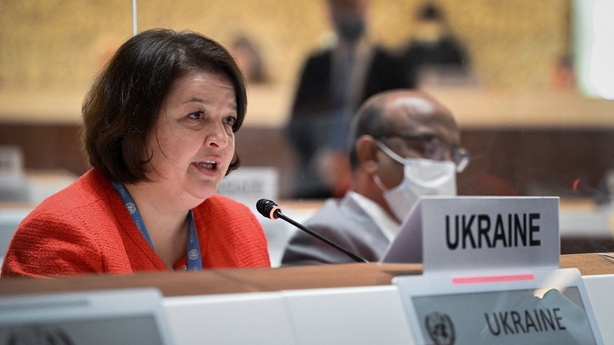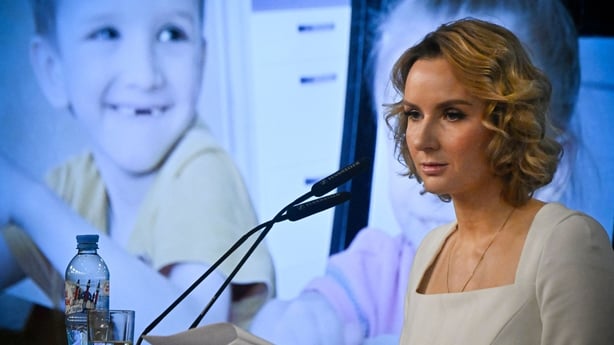The United Nations Human Rights Council has overwhelmingly voted in favour of extending the mandate of an investigative body probing possible war crimes committed since Russia's invasion of Ukraine.
Twenty-eight countries voted in favour, 17 abstained and two voted against the Independent International Commission of Inquiry on Ukraine, which Ukraine says is essential for keeping Russia accountable for its crimes.
"The scope and brutality of Russia's atrocities in Ukraine are simply beyond any human comprehension," Ukraine's ambassador to the UN in Geneva, Yevheniia Filipenko, told the Council ahead of the vote.
"We strongly believe that the continued work of the Commission in further investigating, documenting and reporting human rights violations and international crimes committed against the people in Ukraine could save more innocent lives (and) could contribute to accountability for perpetrators and justice for victims."

In a report published last month, the commission found that some crimes committed by Russian forces in Ukraine, including the use of torture and attacks against the country's energy infrastructure, could constitute crimes against humanity.
Russia, which refused to address the Human Rights Council today, vigorously denies committing atrocities or targeting civilians in Ukraine.
Russia dismisses ICC child deportation claims
Meanwhile, Russia's commissioner for children's rights has dismissed International Criminal Court (ICC) allegations that she was responsible for unlawfully deporting children from Ukraine as false.
The Hague-based ICC on 17 March issued arrest warrants for President Vladimir Putin and Children's Commissioner Maria Lvova-Belova for the war crime of unlawfully deporting children from areas of Ukraine occupied by Russian forces.
The ICC said it had information that hundreds of children had been taken from orphanages and children's care homes in areas of Ukraine claimed by Russia. Some of those children, the ICC said, had been given up for adoption in Russia.
Ms Lvova-Belova told a news conference her commission acted on humanitarian grounds to protect the interests of children in an area where military action was taking place and had not moved anyone against their will or that of their parents or legal guardians, whose consent was always sought unless they were missing.
Nor were children given up for adoption, she said, saying they were placed with temporary legal guardians in foster homes.
"As far as the ICC's accusations are concerned, we don't understand what we are accused of. Give us the facts and we will look into it. So far, it all looks like a farce without specifics and is incomprehensible," she said.

The ICC had not submitted any documents to her office, she complained, noting that Russia did not recognise the court's jurisdiction anyway.
Nor, she said, had Ukraine sent any official requests regarding children allegedly separated from their parents.
Ukraine says it is investigating the deportation of over 16,000 children, many of them taken from parents at "filtration points" as they tried to leave newly captured territory, removed from care institutions, or taken from people who were caring for them after their parents were killed in the war.
"Give us lists of parents who are looking for their children and we will find them. If mothers, fathers...are looking and need help we are open to giving it," said Ms Lvova-Belova.
Re-education allegations
Ms Lvova-Belova called allegations that Ukrainian children had been taken to camps for alleged re-education "a conspiracy theory".
Her commission did not know of a single case of a child from eastern Ukraine being separated from his or her blood relative to be given up to a foster home, she added.
The most deadly conflict in Europe since World War Two has killed or maimed hundreds of thousands of men on both sides while millions of adults and children have been displaced by what has turned into a grinding artillery war.
Ukraine has cast Russia as a brutal imperial aggressor that has committed war crimes, including the theft of children. Russia, which says it is carrying out "a special military operation," says the West has ignored Ukraine's own crimes and denies committing war crimes itself.
Ms Lvova-Belova said Russia had accepted more than 5 million refugees from Ukraine's Donbas region, including 730,000 children with parents or legal guardians, since February 2022,when President Putin ordered troops into Ukraine.
The Russian-installed leaders of two Ukrainian regions claimed and partially controlled by Russia had asked Russia to accept the civilians, including orphans and children whose parents were missing, her commission said.
She said 380 orphans and children not in the custody of their parents had been placed under the guardianship of Russian foster families between April and October of last year.
They would be free to return when the situation was safe, she added, if they were aged 18 or over and wanted to, or if their parents or legal guardians or local authorities took such a decision.

